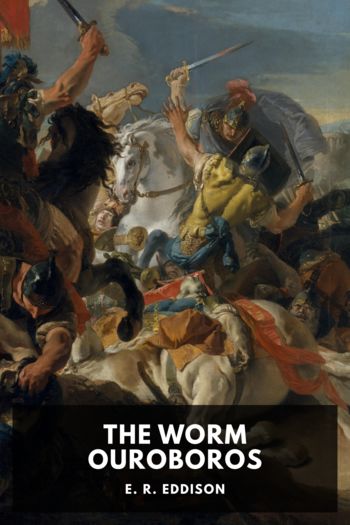The Cream of the Jest by James Branch Cabell (the first e reader TXT) 📕

- Author: James Branch Cabell
Book online «The Cream of the Jest by James Branch Cabell (the first e reader TXT) 📕». Author James Branch Cabell
Such, in any event, is the road that Kennaston took, and such the goal to which he was conducted. So, with that goal in view, I also begin where he began, and follow whither the dream led him. Meanwhile, I can but entreat you to remember it is only by preserving faith in human dreams that we may, after all, perhaps some day make them come true.
Richard Fentnor Harrowby.
Montevideo
14 April 1917.
The tale tells how Count Emmerick planned a notable marriage-feast for his sister La Beale Ettarre and Sir Guiron des Rocques. The tale relates that, in honor of this wedding, came from Nacumera, far oversea, Count Emmerick’s elder sister Dame Melicent and her husband the Comte de la Forêt, with an outlandish retinue of pagan slaves that caused great wonder. All Poictesme took holiday. The tale narrates how from Naimes to Lisuarte, and in the wild hill-country back of Perdigon, knights made ready for the tournament, traveling toward Storisende in gay silken garments such as were suited to these new times of peace. The highways in those parts shone with warriors, riding in companies of six or eight, wearing mantles worked in gold, and mounted upon valuable horses that glittered with new bits and housings. And the tale tells, also, how they came with horns sounding before them.
Ettarre watched from the turrets of Storisende, pensively. Yet she was happy in these days. “Indeed, there is now very little left this side of heaven for you to desire, madame,” said Horvendile the clerk, who stood beside her at his service.
“No, there is nothing now which troubles me, Horvendile, save the thought of Maugis d’Aigremont. I cannot ever be sure of happiness so long as that man lives.”
“So, so!” says Horvendile—“ah, yes, a master-villain, that! He is foiled for the present, and in hiding, nobody knows where; but I, too, would not wonder should he be contriving some new knavery. Say what you may, madame, I cannot but commend his persistency, however base be his motives; and in the forest of Bovion, where I rescued you from his clutches, the miscreant spoke with a hellish gusto that I could have found it in my heart to admire.”
Ettarre had never any liking for this half-scoffing kind of talk, to which the clerk was deplorably prone. “You speak very strangely at times, Horvendile. Wickedness cannot ever be admirable; and to praise it, even in jest, cannot but be displeasing to the Author of us all.”
“Eh, madame, I am not so sure of that. Certainly, the Author of those folk who have figured thus far in your history has not devoted His talents to creating perfect people.”
She wondered at him, and showed as much in the big blue eyes which had troubled so many men’s sleep. “Since time began, there has lived no nobler person or more constant lover than my lord Guiron.”
“Oh, yes, Sir Guiron, I grant you, is very nearly immaculate,” said Horvendile; and he yawned.
“My friend, you have always served him faithfully. We two cannot ever forget how much we have owed in the past to your quick wits and shrewd devices. Yet now your manner troubles me.”
Dame Ettarre spoke the truth, for, knowing the man to be unhappy—and suspecting the reason of his unhappiness, too—she would have comforted him; but Horvendile was not in a confiding mood. Whimsically he says:
“Rather, it is I who am troubled, madame. For envy possesses me, and a faint teasing weariness also possesses me, because I am not as Sir Guiron, and never can be. Look you, they prepare your wedding-feast now, your former sorrows are stingless; and to me, who have served you through hard seasons of adversity, it is as if I had been reading some romance, and had come now to the last page. Already you two grow shadowy; and already I incline to rank Sir Guiron and you, madame, with Arnaud and Fregonde, with Palmerin and Polinarda, with Gui and Floripas—with that fair throng of noted lovers whose innocuous mishaps we follow with pleasant agitation, and whom we dismiss to eternal happiness, with smiling incredulity, as we turn back to a workaday world. For it is necessary now that I return to my own country, and there I shall not ever see you any more.”
Ettarre, in common with the countryside, knew the man hopelessly loved her; and she pitied him today beyond wording. Happiness is a famed breeder of magnanimity. “My poor friend, we must get you a wife. Are there no women in your country?”
“Ah, but there is never any woman in one’s own country whom one can love, madame,” replies Horvendile shrewdly. “For love, I take it, must look toward something not quite accessible, something not quite understood. Now, I have been so unfortunate as to find the women of my country lacking in reticence. I know their opinions concerning everything—touching God and God’s private intentions, and touching me, and the people across the road—and how these women’s clothes are adjusted, and what they eat for breakfast, and what men have kissed them: there is no room for illusion anywhere. Nay, more: I am familiar with the mothers of these women, and in them I see quite plainly what these women will be some twenty years from this morning: there is not even room for hope. Ah, no, madame; the women of my country are the pleasantest of comrades, and the helpfullest of wives: but I cannot conceal it from myself that, after all, they are only human beings; and therefore it has never been possible for me to love





Comments (0)